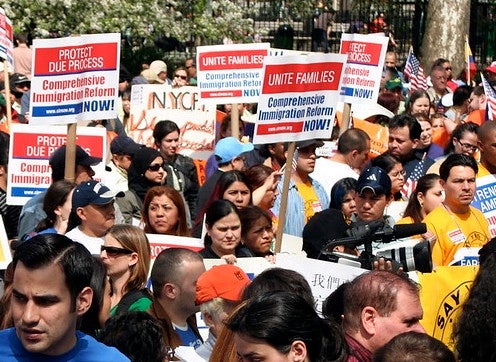Influencing decisions about LGTBQ+ issues at the ballot box

“The research has highlighted several trends. The political climate around gay rights is one where individuals will vote by context. Who do they know? What experiences have they had? Most of the psychology literature tells us people are more likely to vote in LGBTQ+ positive ways if they’ve met gay people, worked with gay people, gone to the movies with gay people.
“It’s not just about passing legislation. It’s also about passing legislation in an environment that celebrates and supports that legislation. Where are the political, economic and social resources for the individuals involved?
“There are real challenges for people who are in small, rural, religious communities. Their only link to community and affirmation is the internet. They have to turn off that computer at some point and go back to a world that doesn’t love and accept them.
“These days I hear a lot of ‘Given that marriage equality has passed, there are so many ways LGBT+ people have it easier.’ But there are a lot of people of color who are gay-identified who have to worry about being shot by police. You also have people who are transitioning genders who have big challenges in certain states that will not allow them the medical care they need.”
Contact: tburnes@usc.edu or evaristo@usc.edu
Survey: Americans support teaching students about controversial issues

“The encouraging takeaway of our results is that U.S. adults want high school students to learn about a wide range of controversial issues including differing perspectives on among the most controversial, like second amendment rights/gun control, and pro-life and pro-choice,” said Anna Saavedra, a scientist at the USC Dornsife Center for Economic and Social Research who conducted the survey. “Adults want the next generation of students to be informed, and not only about their own beliefs, meaning limiting legislation and loud voices are askew with public opinion.”
Morgan Polikoff, a researcher at the USC Rossier School of Education who collaborated on the study: “Our results show that despite the bluster, most Americans don’t know much about what’s being taught in schools. Even so, they have strong, and sometimes divergent opinions about what controversial topics should be taught and to whom.
“Regarding most topics, we found Americans are less conservative than would be inferred by the flurry of state legislation over the past two years designed to restrict education about racism, inequity, bias, and structural injustices. Some of this legislation bans educators from teaching anything that causes students ‘discomfort’ or ‘guilt’ due to their race or sex. We found that American adults overwhelmingly want students in high school to learn about controversial topics, including different sides of all the issues we asked about (e.g., pro-life and pro-choice; Second Amendment rights and gun control).”
Americans diverge over teaching about LGBTQ+ issues
Saavedra: “The exceptions to this bipartisanship were all related to LGBTQ issues: gay rights, sexual orientation, gender identity, and trans rights. For each of these four items, while 84% to 86% of Democrats supported students learning about these topics in high school, less than half as many Republicans (30-39%) were in support. Clearly, on LGBTQ issues there are very sharp partisan divides. In each of these cases, respondents not affiliated with either of the two major political parties (e.g., independents, Green Party, Libertarian) fell in between, with 59-66% support.”
On critical race theory

Contact: asaavedr@usc.edu, polikoff@usc.edu or gersema@usc.edu





